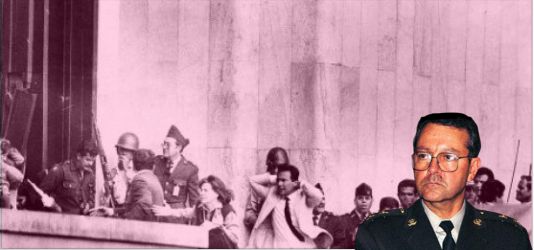In a decision dated June 6, 2022, the Review Section -SR- of the JEP Court rejected the petition for review filed by the defense of retired General Jesús Armando Arias Cabrales, convicted in the ordinary jurisdiction for forced disappearance in the context of the “Retaking” of the Palace of Justice on November 6 and 7, 1985.
The rejection was the result of a previous inadmissibility made by the SR on January 19, 2022 with respect to General Arias Cabrales’s first motion for review. On that occasion, the reasons for the inadmissibility were mainly due to the fact that the facts and evidence provided by the defense, although they met the requirement of novelty, did not meet the requirement of transcendence that is demanded in this type of process. That is to say, certainly the evidence and facts alleged were novel inasmuch as they were known or accessed after the conviction, but not transcendent because both the evidence and the facts did not have the capacity to modify the sense of the conviction.
Therefore, the Review Section, in compliance with the established procedure, requested Arias and his defense to correct the deficiencies of the petition for review within five days. The defense made the adjustments, but the Section, upon reviewing this new brief, ratified its conclusions regarding the deficiencies of the complaint, concluding that the burden of improving the argumentation previously set forth was not met. On the contrary, it observed that there was not an adequate development of the arguments and that it was not possible to explain why the facts and evidence provided could eventually have the capacity to refute the considerations that led to the conviction of Arias Cabrales in the ordinary jurisdiction. Consequently, it proceeded to reject the request for review.
In the petition for review and in the brief of correction, the defense of Arias Cabrales raised a hypothesis that he had already put forward in his defense in the ordinary jurisdiction and that, in addition to having no legal basis, it is a serious affront to the victims, consisting of affirming that, since after his first instance conviction in 2011 there were some genetic reports and interviews that concluded that it was impossible to identify some skeletal remains, this meant that they could correspond to the remains of the disappeared persons, and that it was a matter of misdeliveries but not the crime of forced disappearance, as the State said at the time1.
In this regard, the Supreme Court of Justice Criminal Chamber in the September 2019 ruling that upheld Arias’ 40-year prison sentence, stated about the difficulties in identifying the skeletal remains and, consequently, about the hypothesis of Cabrales’ defense, that:
(…) Of all of them, their whereabouts are still unknown. It may happen that their remains are found; but that does not mean that they have not disappeared. The fact that after the retaking they were seen in the hands of the state forces (sic) and that they have not been handed over to the jurisdictional authority, if it was considered that there were indications of their links with the terrorist group, is the manifestation of their legal disappearance. To think otherwise is to offend the pain of the victims and revictimize them (…) (Bold emphasis added).
In the case of General Arias Cabrales, it is worth remembering that he entered the JEP in a way that early on warned of the lack of commitment he would have with the Jurisdiction. Prior to his conviction by the Supreme Court of Justice, at the beginning of 2017, the General expressed his willingness to submit to the JEP, however, a few months later he reversed his request and wanted to wait if the ruling of the CSJ was convenient for him or not.
In November 2019, following the ratification of the conviction by the Criminal Chamber of the Court in September 2019, he submitted to the SR his request for a review of the sentence against him handed down by the Superior Court of Bogota in 2014. At the current procedural stage, as in the beginning, Arias Cabrales has shown that he is not interested in providing truth or reparations to the victims, as has been the case for the past 36 years.
Another point to highlight in the decision is how the Section, recognizing the slow pace of the submission of Mr. Arias Cabrales, called on the Chamber for the Definition of Legal Situations to resume its functions with regard to this high military commander, and to resolve the appeal filed by the victims regarding the admission of the submission of Arias Cabrales, which will be a scenario to put on the table, once again, the lack of commitment and contrary attitudes of Arias and his defense regarding his commitments to transitional justice.

